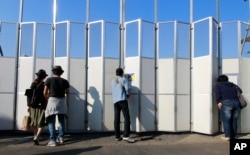The president of the International Olympic Committee this week urged Tokyo's mayor not to change the rules of the competition after city authorities announced several changes to the venues for the 2020 games in order to cut spiraling costs.
The budget had been estimated at $15 billion, six times the original cost.
The venues for basketball, taekwondo and cycling have been moved outside of Tokyo to existing facilities, and other construction projects are under review.
Tokyo Mayor Yuriko Koike said while meeting IOC President Thomas Bach this week that she owed such frugality to the people of Tokyo, as it is their public funds that would be spent.
“It is necessary that we win their understanding,” she added.
Bach, however, urged the mayor not to "change the rules" of the competition.
"We will continue in this way of cooperation to make the Olympic Games Tokyo 2020 the most sustainable and feasible games possible," he said.
Tokyo's fear over spiraling costs was echoed in Rome, whose mayor Virginia Raggi from the anti-establishment Five Star movement announced last month that the city would withdrawal from the race to host the 2024 Games.
"What these Olympics require is taking on additional debt,” Raggi said. “Sincerely, we don't feel that is right.”
The IOC faces a growing problem, as fewer and fewer cities are prepared to cover the costs, says Olympic historian Philip Barker.
"We've seen it with the Winter Games for 2022,” he said. “It was only Beijing and Almaty, after two excellent candidates — Oslo and Stockholm, who you would have thought were perfectly suited to the Winter Games — pulled out because of costs.”
The U.S. city of Boston and the German city of Hamburg also withdrew their bids for the 2024 Summer Games last year.
Beijing's 2008 games, and the Sochi Winter Olympics in 2014 both cost tens of billions of dollars. The IOC is now trying to change the image of the games from one of excess to one of sustainability.
"Let's make a positive virtue out of not building new facilities, out of using what they call ‘demountable’ facilities — that is to say temporary builds that can then be deconstructed and sent somewhere else,” Barker said.
Some people push for the Summer Games to permanently located in their original home of Greece. That, however, is not realistic, Barker argues.
"Part of the attraction of the Olympics is that they do go from place to place,” he said. “It's an international sporting event, it isn't just for one city."
But the IOC still has work to do to convince many world cities that hosting the Olympics is a boon, not a burden.















